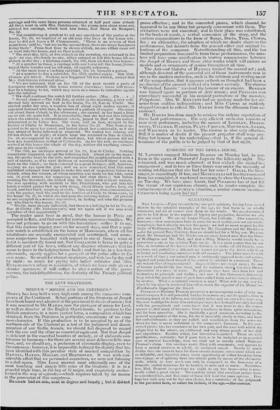THE LENT ORATORIOS.
MERU'S "JOSEPH AND HIS BRETHREN."
MEHUL has long held a very high rank among the numerous composers. of the Continent. Select portions of the Oratorio of Joseph have been heard and admired at the provincial festivals of music; but it was reserved to Mr.H AWEs, now the purveyor of music for Lent, as well as director at the English Opera-house, to produce to the British amateurs, in a more perfect form, a composition which has obtained, front the Parisians in particular, encomiums of no common character. If this production is to be accepted by us of the northern side of the Channel as a test of the judgment and discrimination of our Gallic friends, we should feel disposed to regard both the one and the other as somewhat equivocal. Not that Joseph is deficient in the essential beauties of melody, or of elaborate contrivance in harmony—for there are several most delicious little motwos, and, we should say, a profusion of chromatic display, even to tiresomeness : however, it is impossible to forget the dignity that has been identified with this peculiar style of musical composition by HANDEL, HAYDN, MOZART, and BEETHOVEN. It was with considerable effort that -we persuaded overselves, we were not listening to a dull opera. Miss LOVE marred most effectually one of the most touching and simple little arias of the Oratorio : it is in a graceful triple time, in the key of G major, and exquisitely orchestenzed in the way of episode,—which requires talent by no means in the possession of this songstress. . BRAHMA had an aria, next indegree and beauty ; but itdit . not prove effective ; and in the concerted pieces, which abound, he appeared to be any thing but properly conversant with them. The recitatives were not executed; and in their place was substituted, in the books of words, a verbal connexion of the story, and the various compositions in the form of Songs, Duets, Trios, Chorus, &c. ; an alternative, the adoption of which no doubt shortens the performance, but detracts from the general effect and original intentions of the composer. Notwithstanding all this, and.the too limited preparation inseparable from these performances, the amateur will have some gratification in tracing comparisons between the Joseph of MEHUL and those elder works which vil1 endure as models and as ornaments of genius throughout all time.
The Adis and Galatea of HANDEL formed the second act ; and, although divested of the powerful aid of those instruments now in use in the modern orchestra, such is the intrinsic and sterling merit of the composition, that it appears as fresh as though it had been a production of the present instead of a former century. The chorus " Wretched Lovers' received the honour of an encore. BRAHAN1 was himself again in portions of Ads' music; PHILLIPS was exceedingiy successful in his musical portraiture of the monster, Polypheme. Mrs. W. KNYVETT had an apology made for her absence from sudden indisposition ; and Miss CAWSE as suddenly stepped forward to relieve Mr. HAwEs from the dilemma thus occasioned.
Mr. HAWES has done much to retrieve the sinking reputation of these Lent performances. His very efficient orchestra consists of near sixty performers, including the names of LINDLEY, DRACONErr 1, WILLMAN, HARPER, PLATT, CROUCH, MOUNTAIN, ADAMS, and WEICHSEL as its leader. The chorus is also very eff*ective. Still it is matter of doubt if the present pro;ector shall nap anything but honour by his undertaking—that Is, if the general attendance of the public is to be judged by that of last night.


















 Previous page
Previous page